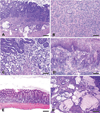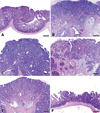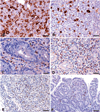Roles for inflammation and regulatory T cells in colon cancer
- PMID: 20019355
- PMCID: PMC4068028
- DOI: 10.1177/0192623309354110
Roles for inflammation and regulatory T cells in colon cancer
Abstract
Risk for developing cancer rises substantially as a result of poorly regulated inflammatory responses to pathogenic bacterial infections. Anti-inflammatory CD4(+) regulatory cells (T(REG)) function to restore immune homeostasis during chronic inflammatory disorders. It seems logical that T(REG) cells would function to reduce risk of inflammation-associated cancer in the bowel by down-regulating inflammation. It is widely believed, however, that T(REG) function in cancer mainly to suppress protective anticancer inflammatory responses. Thus roles for inflammation, T(REG) cells, and gut bacteria in cancer are paradoxical and are the subject of controversy. Our accumulated data build upon the "hygiene hypothesis" model in which gastrointestinal (GI) infections lead to changes in T(REG) that reduce inflammation-associated diseases. Ability of T(REG) to inhibit or suppress cancer depends upon gut bacteria and IL-10, which serve to maintain immune balance and a protective anti-inflammatory T(REG) phenotype. However, under poorly regulated pro-inflammatory conditions, T(REG) fail to inhibit and may instead contribute to a T helper (Th)-17-driven procarcinogenic process, a cancer state that is reversible by down-regulation of inflammation and interleukin (IL)-6. Consequently, hygienic individuals with a weakened IL-10- and T(REG)-mediated inhibitory loop are highly susceptible to the carcinogenic consequences of elevated inflammation and show more frequent inflammation-associated cancers. Taken together, these data help explain the paradox of inflammation and T(REG) in cancer and indicate that targeted stimulation of T(REG) may promote health and significantly reduce risk of cancer.
Figures






References
-
- American Cancer Society (ACS) Cancer facts and figures. Atlanta, GA: U.S. Cancer Fact and Figures. ACS; 2004.
-
- Awasthi A, Carrier Y, Peron JP, Bettelli E, Kamanaka M, Flavell RA, Kuchroo VK, Oukka M, Weiner HL. A dominant function for interleukin 27 in generating interleukin 10-producing anti-inflammatory T cells. Nat Immunol. 2007;8:1380–1389. - PubMed
-
- Badache A, Hynes NE. Interleukin 6 inhibits proliferation and, in cooperation with an epidermal growth factor receptor autocrine loop, increases migration of T47D breast cancer cells. Cancer Res. 2001;61:383–391. - PubMed
-
- Balkwill F, Coussens LM. Cancer: An inflammatory link. Nature. 2001;431:405–406. - PubMed
Publication types
MeSH terms
Substances
Grants and funding
LinkOut - more resources
Full Text Sources
Medical
Research Materials

